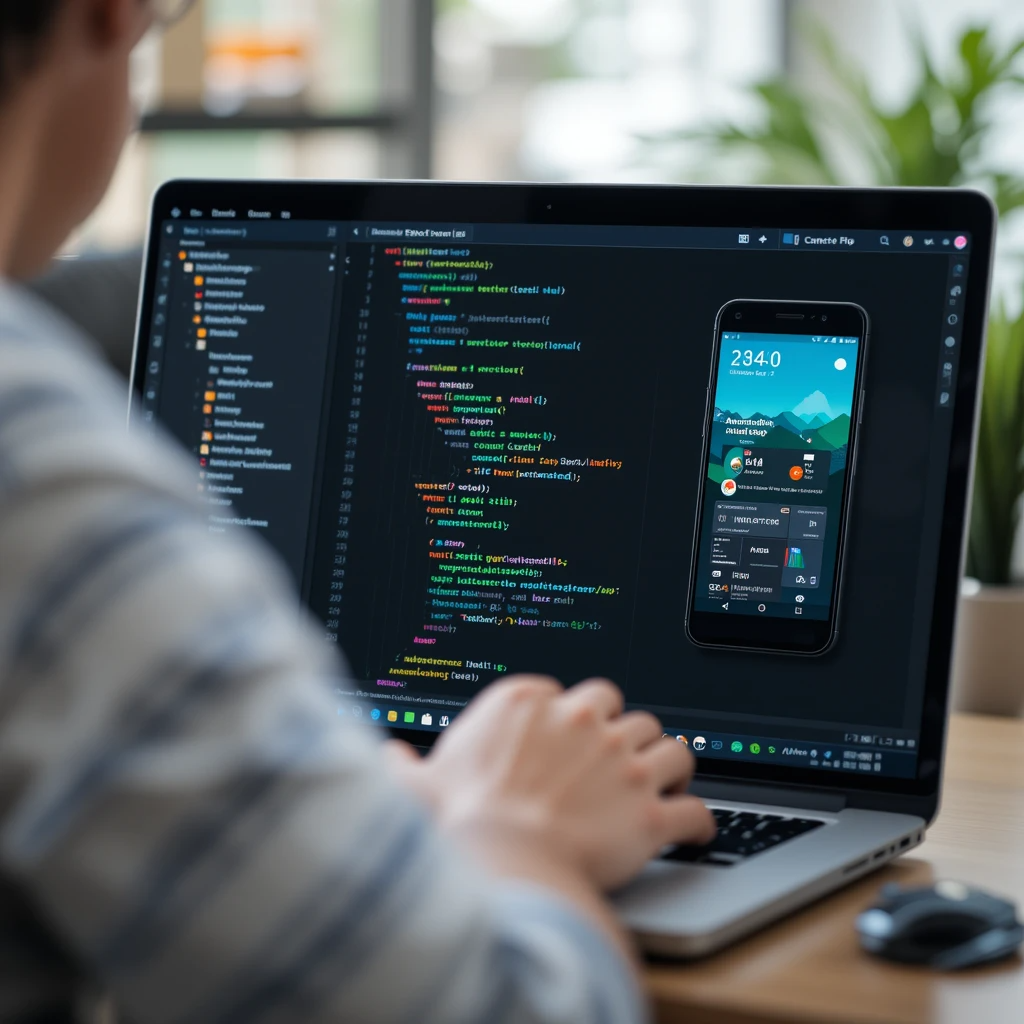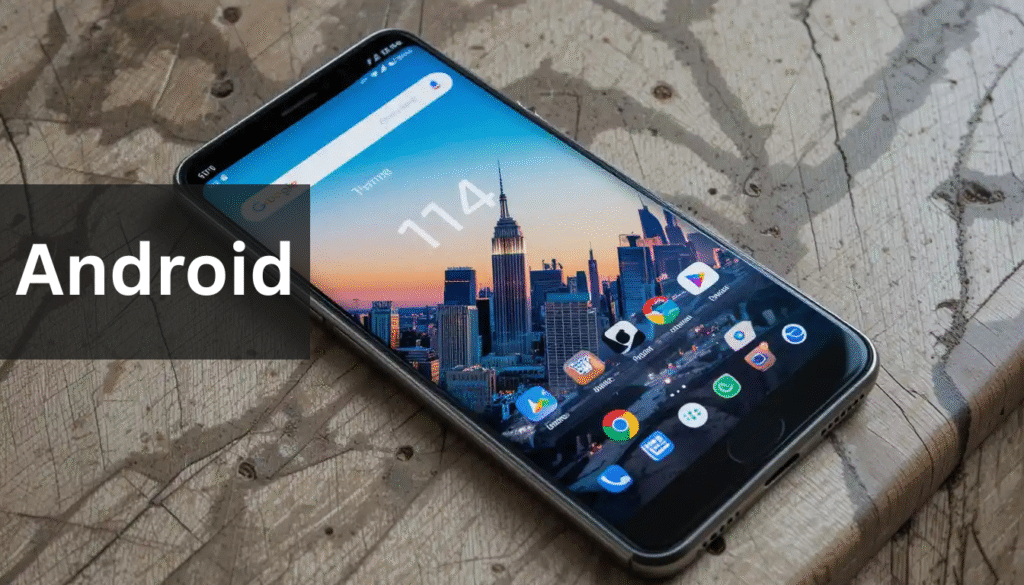Imagine waking up, grabbing your phone, checking the weather, setting reminders, and launching your favorite podcast—all before your coffee finishes brewing. That’s not just convenience. That’s the power of Android.
In a world increasingly shaped by mobile technology, Android continues to dominate the digital landscape. From budget-friendly smartphones to powerful tablets, and now even cars via Android Auto, the Android ecosystem has transformed how we live, work, and play. In this guide, we’re diving deep into the Android operating system, exploring its evolution, capabilities, and the latest in 2025, including Android 14 and what sets Android apart from iOS.

Let’s unpack everything you need to know—from Android download options to Android app development, and everything in between.
A Quick History of Android: From Humble Beginnings to Market Leader
- Android 1.0 (launched in 2008) marked the beginning of Google’s mobile journey.
- It was basic but functional, offering features like Gmail sync, Google Maps, and YouTube.
- Over time, Android versions evolved rapidly—each update named after desserts like Cupcake, Jelly Bean, and Oreo, up until Android 10 when Google switched to numbers.
In 2025, we’re living in the era of Android 14, a sleek, secure, and AI-driven version that reflects just how far this open-source platform has come.
Why Android Is Still the Go-To Platform in 2025
Flexibility & Customization
One of Android’s biggest flexes? You can make it your own. Whether you’re a techie developing apps via Android Studio or a regular user just looking to rearrange widgets—Android lets you do it.
Wider Hardware Range
From premium Android Samsung devices to budget-friendly phones in emerging markets, Android runs on it all. That’s part of the reason it holds over 70% of the global smartphone market share.
Google Integration
Google is the brain behind Android, so you get native support for Search, Gmail, Drive, and YouTube like no other.
What’s New in Android 14?
Released in late 2024, Android 14 introduced features that focus on:
- AI-Powered Customization – Dynamic wallpapers based on your mood, activity, or location.
- Smarter Notifications – Adaptive alerts that reduce spam and prioritize urgent messages.
- Privacy Enhancements – More granular permissions for location, camera, and microphone.
- Faster Performance – Better RAM management and reduced app launch times.
If you’re using a modern Android phone, chances are you’ve already received the update or it’s rolling out soon.
Essential Android Apps for Every User
No matter what you’re into—gaming, productivity, creativity—there’s an app for it. Here are some must-haves in 2025:
Productivity
- Notion – Plan your life with databases and calendars
- Slack – Stay in the loop with your remote team
- Google Calendar – Synced beautifully across devices
Entertainment
- Spotify – Your music, your vibe
- Twitch – Streamers’ paradise
- Netflix – Binge-worthy classics and originals
Utilities
- Solid Explorer – A file manager that’s both functional and aesthetic
- LastPass – Keep your passwords secure
- Google Translate – Bridging language gaps
Want to get started? Just go to Google Play Store for a secure Android app download experience.
Android vs. iOS: The Eternal Debate
Both systems have their loyal fans, but here’s a quick comparison to help you choose:
| Feature | Android | iOS |
| Customization | High | Limited |
| Device Variety | Wide range (Samsung, Pixel) | Only Apple |
| File Sharing | Easier with Bluetooth/USB-C | AirDrop exclusive |
| App Store Guidelines | More developer freedom | Stricter policies |
| Open Source | Yes | No |
Verdict: If freedom, variety, and personalization are your thing, Android wins hands down.
Android Auto: Driving into the Future
With Android Auto, your car becomes smarter:
- Voice Commands: Say “Hey Google, take me home.”
- Navigation: Google Maps and Waze built-in
- Entertainment: Spotify, YouTube Music, Audible
- Calls & Messages: Hands-free communication
Whether you’re commuting or road-tripping, Android Auto keeps you connected without distraction.
Developing with Android Studio: A Playground for Creators
Thinking of building your own app? Welcome to the developer’s playground—Android Studio.

Why use Android Studio?
- Intuitive interface for beginners and pros
- Built-in emulator for testing apps
- Supports Kotlin, Java, and even Flutter
- Smart code completion and debugging tools
Want to distribute your app? Package it as an Android APK and publish on Google Play for mass access. You can even offer an Android app download directly from your site if you prefer independent distribution.
Security and Privacy: Is Android Safe?
Yes—and here’s why:
- Google Play Protect scans 100 billion apps daily.
- Biometric Authentication secures logins and payments.
- Sandboxing limits app access to sensitive data.
- Frequent Updates: Monthly security patches are the norm now.
You can even set up a secure Android login for all your apps using fingerprint or face ID, depending on your device.
Top Android Brands in 2025
Here’s who’s killing the game this year:
- Samsung – Still the king with Galaxy S-series and Z Fold models
- Google Pixel – The purest Android experience
- OnePlus – Smooth performance and OxygenOS
- Motorola – Budget models with serious performance
- ASUS & Xiaomi – Rising stars in the midrange game
Buying a new Android phone today means access to a powerhouse in your pocket, regardless of your budget.
Android for Power Users: Tips to Boost Your Experience
- Enable Developer Mode for advanced tweaks
- Use Nova Launcher to completely revamp your home screen
- Automate tasks with Tasker
- Backup everything using Google One
- Download apps outside the Play Store with trusted Android APK files
FAQ
What is Android and how does it work?
Android is an open-source mobile operating system developed by Google. It powers smartphones, tablets, TVs, and even cars. It allows users to download apps, browse the web, and customize their experience.
Can I update my phone to Android 14?
If your device is compatible and the manufacturer has rolled out the update, you can upgrade to Android 14 through your phone’s settings under “Software Update.”
What’s the difference between Android and iOS?
Android offers more customization and runs on various brands, while iOS is exclusive to Apple. Android is more flexible, whereas iOS is known for its seamless ecosystem.
Is it safe to download Android apps from outside the Play Store?
Yes, but only if you’re downloading from trusted sources. Stick to verified Android APK files and always enable Play Protect for extra safety.
How do I download apps on an Android device?
Open the Google Play Store, search for the app you want, and tap “Install.” For other apps, you can download APK files and install them manually by enabling “Unknown Sources.”
What is Android Auto and do I need it?
Android Auto connects your phone to your car’s infotainment system, allowing you to access Google Maps, music, and calls safely while driving. It’s especially useful for frequent drivers.
What is Android Studio used for?
Android Studio is the official IDE for Android app development. It’s used by developers to code, test, and debug Android apps for phones, tablets, and wearables.
Why do different Android phones look different?
Because Android is open-source, manufacturers like Samsung, OnePlus, and Xiaomi use custom interfaces (e.g., One UI, OxygenOS) to create unique user experiences.
Can I install Android on a non-Android device?
Technically yes, but it’s not simple. There are custom ROMs and emulators that allow Android to run on PCs and some smart devices, but they require advanced technical skills.
What should I do if my Android login isn’t working?
First, check your internet connection. If the issue persists, try resetting your Google account password or clearing cache/data from the Google Play Services app.
Final Thoughts:
So here’s the deal: Android isn’t just an OS. It’s an entire ecosystem built to evolve with you. Whether you’re a student juggling apps for school, a developer building the next viral game, or a business owner running campaigns from your Android phone, it’s the platform that adapts to your life—not the other way around.
You May Also Like :
